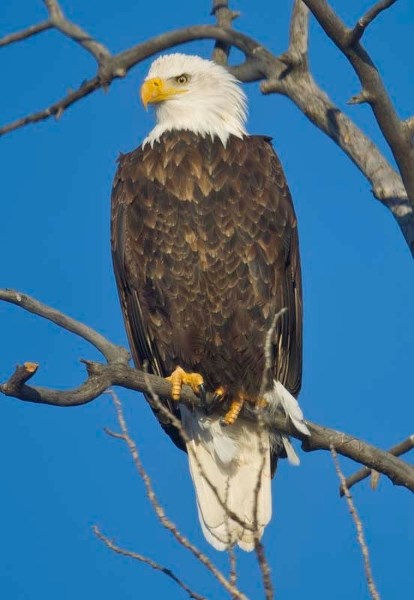Bird count time
St. Albert's Christmas bird count needs you to head out and beat some bushes.
City ornithologists are gearing up for the 24th annual St. Albert Christmas Bird Count later this month.
The annual event draws bird enthusiasts together to do a census of the city's winter bird population, and covers a 24-kilometre circle that includes St. Albert and Villeneuve.
Count co-ordinator Alan Hingston says he's looking for about 100 feeder watchers and 50 bush-beaters for this year's count.
"We've been slipping on the number of bush-beaters in recent years," he notes, as many of the count's veterans are getting older.
Hingston says he's looking for volunteers who want to head out on count day with an experienced birder to count birds. Volunteers can also stay at home and count birds at their feeders.
"It doesn't have to be an all-day thing."
Count results will then be sent to Bird Studies Canada to determine trends in bird populations.
Hingston also encouraged residents to send in reports of any unusual bird sightings in the days leading up to the count.
He's already heard reports of robins camped out in Erin Ridge, and he's interested to see if any common redpolls show up – last year was only the second time in count history that the redpolls were absent from the count (the first was in 1994). Last year also set an all-time record for dark-eyed juncos.
The Edmonton Nature Club is holding two courses next week to help counters identify backyard birds. One is on Dec. 9 at Wild Birds Unlimited and the other is Dec. 11 at the Wildbird General Store.
"There are a surprising number of birds that overwinter," says Steve Kulak, co-owner of the Wildbird General Store, including snow buntings, chickadees and woodpeckers. Bald eagles and gyrfalcons are known to overwinter at the grain terminal on Yellowhead Trail.
Both talks are $10, with details available at edmontonnatureclub.org.
The St. Albert count runs all day but mostly from 8 a.m. to 4 p.m. on Dec. 27. Call Hingston at 780-459-6389 or [email protected] for details.
2014 could be hottest yet
2014 is on track to be the hottest year in recorded history, the World Meteorological Organization says.
The WMO put out a statement Wednesday that 2014 will likely be one of the warmest, if not the warmest, year on record if temperatures continue on their current trends.
Researchers suggest that global temperatures from January to October were about 0.57 C above the 1961-1990 average of 14 C and 0.09 C hotter than the average for the last 10 years, the WMO reports. That makes 2014 tied for first for this time period with the current record-holder, 2010, and on track to surpass it if this trend continues through the rest of the year.
The WMO notes that the record-breaking heat, massive floods and rainfalls seen globally this year are all consistent with a warming, changing climate.
"Record-high greenhouse gas emissions and associated atmospheric concentrations are committing the planet to a much more uncertain and inhospitable future," WMO secretary-general Michel Jarraud said in a press release.
Canada has actually bucked the trend so far this year, with three out of its four seasons so far being slightly colder than normal, said David Phillips, climatologist with Environment Canada.
"Stick a thermometer in the planet and you'll see global fever," he said, but it seems like Nature didn't give Canada the memo this year.
Phillips said it won't be a huge surprise if this year is a record-breaker when it comes to temperature – the world has also seen a string of warm years ever since 2000, with about 14 of the top 15 warmest years in recorded history happening since 2000.
"The world is heating up," he said, and that will mean more extreme, less predictable weather in years ahead.
Residents can help reduce the risk of extreme weather by lowering their greenhouse gas emissions, said Katharine Ricke of the Carnegie Institute for Science, who published a paper in Environmental Research Letters this week showing how the warming impacts from greenhouse gas emissions hit their peak within 10 years of their release.
Extreme weather events carry heavy economic costs and become more likely as the climate warms, Ricke noted in an interview.
"The benefits of not emitting a tonne of CO2 today aren't just going to be experienced by my children or my grandchildren. They'll actually occur within my lifetime."




